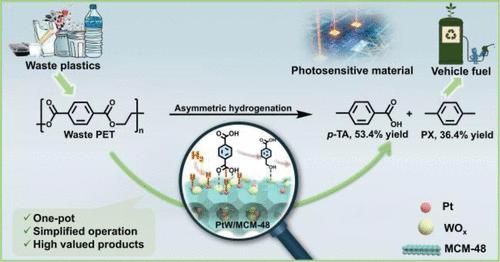通过精确调节的中等酸位控制吸附,选择性不对称加氢废聚对苯二甲酸乙二醇酯
IF 15.6
1区 化学
Q1 CHEMISTRY, MULTIDISCIPLINARY
引用次数: 0
摘要
废聚对苯二甲酸乙二醇酯(PET)的部分加氢为生产有价值的化学品提供了很好的机会,但实现精确的催化控制仍然具有挑战性。在此,我们首次使用特殊设计的PtW/MCM-48催化剂,实现了废PET一锅选择性加氢制对甲苯(p-TA),收率达到创纪录的53.4%,对二甲苯(PX)收率达到36.4%。机制研究表明,特殊的催化性能是由Pt纳米粒子与WOx物种之间的协同相互作用引起的。低价WOx增强了Pt的分散性,而Pt稳定WOx为低聚合的多钨酸盐。PtW1.5/MCM-48的酸度适中,可控制p-TA的解吸,防止过加氢生成PX。催化剂在真实的PET废料中表现出强劲的性能。生命周期评价和技术经济评价进一步突出了其实际可行性。本研究为PET化学升级回收建立了一条可持续的途径,并为设计用于选择性氢化反应的先进催化剂提供了框架,解决了循环化学和塑料废物管理中的关键挑战。本文章由计算机程序翻译,如有差异,请以英文原文为准。

Selective Asymmetric Hydrogenation of Waste Polyethylene Terephthalate via Controlled Sorption through Precisely Tuned Moderate Acid Sites
The partial hydrogenation of waste polyethylene terephthalate (PET) offers a great opportunity to produce valuable chemicals, yet achieving precise catalytic control remains challenging. Herein, for the first time, we realized one-pot selective hydrogenation of waste PET to p-toluic acid (p-TA) with a record-high yield of 53.4%, alongside a 36.4% yield of p-xylene (PX), using a specially designed PtW/MCM-48 catalyst. Mechanistic investigations revealed that the exceptional catalytic performance arises from synergistic interaction between Pt nanoparticles and WOx species. Low-valent WOx enhances Pt dispersion, while Pt stabilizes WOx as low-polymerized polytungstates. The moderate acidity of PtW1.5/MCM-48 ensures controlled desorption of p-TA, preventing overhydrogenation to PX. The catalyst demonstrated robust performance with real-world PET waste. Life cycle assessment and technical and economic evaluation further highlight its practical feasibility. This study establishes a sustainable pathway for PET chemical upcycling and provides a framework for designing advanced catalysts for selective hydrogenation reactions, addressing critical challenges in circular chemistry and plastic waste management.
求助全文
通过发布文献求助,成功后即可免费获取论文全文。
去求助
来源期刊
CiteScore
24.40
自引率
6.00%
发文量
2398
审稿时长
1.6 months
期刊介绍:
The flagship journal of the American Chemical Society, known as the Journal of the American Chemical Society (JACS), has been a prestigious publication since its establishment in 1879. It holds a preeminent position in the field of chemistry and related interdisciplinary sciences. JACS is committed to disseminating cutting-edge research papers, covering a wide range of topics, and encompasses approximately 19,000 pages of Articles, Communications, and Perspectives annually. With a weekly publication frequency, JACS plays a vital role in advancing the field of chemistry by providing essential research.

 求助内容:
求助内容: 应助结果提醒方式:
应助结果提醒方式:


